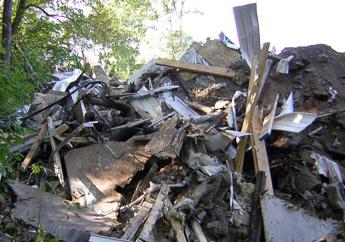
As Missouri communities continue to grow, older buildings are renovated or demolished to make room for newer, more modern buildings and structures. Properly managing and disposing of the waste during the construction, renovation or demolition process can lessen or even prevent the impact of the project on human health and the environment.
The department regulates demolition and renovation projects for institutional, commercial, public and industrial structures, as well as residential structures. Any individual, business or other entity beginning this type of project should also be aware of the various state regulations and local ordinances and regulations that apply to a project before it starts. There may be local ordinances that are stricter than the state’s rules and regulations, so be sure to check with local city and county regulatory agencies before you begin the project. You can also discuss regulatory requirements with staff from the department regional office in your area or contact the department's Waste Management Program.
Waste Management
Demolition or renovation projects can create several different kinds of waste:
- Materials that may be recovered and re-used or used for a different purpose
- Waste materials that cannot or will not be reused or re-purposed
- Hazardous wastes, including asbestos-containing materials
The management and disposal requirements differ for each type of waste. Certain wastes, such as asbestos, require extra care and special handling and disposal measures to prevent the material from becoming friable or to make certain no one is exposed to the material if it becomes airborne. In contrast, individuals who perform a construction, renovation or demolition project at their residence may burn untreated wood produced from the project, either as a heat source or for disposal. However, local city or county ordinances may regulate where the burning occurs or require approval from or notification to the local fire department. Check with the local city and county regulatory agencies before you open burn any untreated wood waste.
All other construction, renovation and demolition project waste must be properly disposed of at a permitted solid waste processing facility or landfill, regardless of whether it came from a commercial or residential project. For more information about managing wastes during construction, renovation or demolition, review the department's Managing Construction and Demolition Waste - PUB2045 and Managing Solid Waste Encountered During Excavation Activities - PUB2192 fact sheets.
Planning Ahead
Diligent planning and preparing for certain wastes you may encounter during your project will protect everyone completing the project and dealing with the waste after it leaves the project site. If a project is bid out for a contractor or subcontractor to complete the work, the individual or business requesting the work should include proper waste disposal as part of the contract terms. This will guarantee waste disposal is considered in the bid.
Including proper waste disposal in the contract terms deflects liability for damages and proper disposal costs for the waste if it is not managed and disposed of according to regulatory requirements. In Missouri, illegal waste disposal from these projects may result in administrative action or civil or criminal lawsuits against the person or company who violated the waste management and disposal regulatory requirements. Because the administrative actions or lawsuits may result in assessing penalties and fines, it is important to become familiar with, and comply with, the requirements for proper waste management and disposal.
